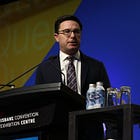Liberal Party Faces Mounting Pressure Over Senator's Indian Community Comments
Today’s email is brought to you by Empower your podcasting vision with a suite of creative solutions at your fingertips.
The Liberal Party confronted escalating political damage Tuesday as calls intensified for a formal apology to Australia's Indian community following controversial remarks by Shadow Indigenous Affairs Minister Jacinta Nampajimpa Price.
Liberal member for Cook Simon Kennedy acknowledged the comments were "damaging for the Liberal Party" during a Sky News panel discussion, noting the controversy was "blowing up" among Liberal supporters of Indian heritage. However, Kennedy stopped short of offering a direct apology, despite similar gestures from Liberal colleagues Julie Bishop, Lisa Reynolds and Tim Wilson.
"Jacinta's expressed regret. She's called her comments a mistake," Kennedy said. "I think that's out there and in the public narrative now."
The political fallout dominated Tuesday's Newsday program, overshadowing substantive policy debates about immigration and climate targets. Labor member for Reid Sally Sitou called Price's original comments "disappointing and divisive," arguing they dismissed an entire community's contributions to Australian society.
"If you were to walk into any hospital or pharmacy or GP office, you will see that the contributions of the Indian community are integral to our society here," Sitou said. "In the Senate chamber alone, if she were to speak to Senators Varun Ghosh or Dave Sharma, both of Indian heritage, both making extraordinary contributions to our parliament."
The controversy has exposed broader tensions within the Coalition over immigration policy. Kennedy revealed his wife is "an immigrant of Indian heritage" and said he discussed the matter with her Tuesday morning, but maintained Price's expression of regret was sufficient.
Truth matters. Quality journalism costs.
Your subscription to Mencari directly funds the investigative reporting our democracy needs. For less than a coffee per week, you enable our journalists to uncover stories that powerful interests would rather keep hidden. There is no corporate influence involved. No compromises. Just honest journalism when we need it most.
Not ready to be paid subscribe, but appreciate the newsletter ? Grab us a beer or snag the exclusive ad spot at the top of next week's newsletter.
Immigration Numbers Spark Policy Clash
The political dispute quickly expanded into a heated exchange over Australia's immigration levels, with Kennedy citing "over a million new immigrants in two years with only 350,000 houses" as the core issue behind community pressures.
Kennedy argued current immigration numbers remain around 400,000 annually, with projections of 370,000 for the current year representing minimal reduction. He criticized the government for excluding construction workers, electricians and boilermakers from priority skilled migration lists.
"They're actually excluded by legislation from the Labor Party as priority skills to import," Kennedy said. "They're in legislation excluded because they want to protect union workers in these areas because shortages benefit them."
Sitou defended the government's approach, highlighting that immigration numbers peaked during post-pandemic recovery when Australians returned home and international students resumed studies. She challenged the Coalition to specify where they would reduce immigration.
"The skilled migrants that we desperately need, doctors, nurses, those working in aged care, do they want to cut those numbers?" Sitou asked. "Where do they want to cut the numbers?"
The Labor politician noted the Coalition blocked government proposals to cap international student numbers, questioning their commitment to meaningful immigration reform.
Climate Targets Face Economic Scrutiny
Discussion shifted to anticipated 2035 emissions reduction targets, with Kennedy demanding transparency about economic costs following a Business Council of Australia report suggesting Australia would struggle to achieve 50 percent reductions under current policies.
The BCA analysis, released within 48 hours of the panel discussion, warned that achieving 65-75 percent reductions could cost "half a trillion dollars at the top end of that target," according to Kennedy.
"Energy prices are up 40 percent. We're nowhere near the renewable energy target and emissions are flatlining," Kennedy said. "I want Labor to answer, what is this going to cost the economy? What is this going to cost the average Australian?"
Sitou countered by emphasizing the "cost of inaction" under previous Coalition governments, arguing policy uncertainty had deterred business investment. She highlighted current renewable energy comprising 40 percent of Australia's energy mix and record private investment in the sector.
"What we have done now that we've been in government is to give business certainty and very clear targets for where we're trying to get to as a country," Sitou said. "We are on track to meet our targets of 82 percent by 2030."
The government's Home Energy Battery Scheme has attracted nearly 50,000 household applications within months of launch, according to Sitou, demonstrating public support for renewable energy initiatives.
Political Implications
The panel discussion revealed ongoing strategic challenges for both major parties ahead of the next federal election. The Liberal Party faces pressure to contain damage from Price's comments while articulating clear positions on immigration and climate policy.
Kennedy's call for the Coalition to "lean in" on climate targets suggests internal debates about party positioning on environmental issues. His emphasis on economic costs reflects traditional Liberal Party messaging about government spending and energy prices.
Labor's strategy appeared focused on highlighting Coalition policy failures while defending current immigration and climate initiatives. Sitou's repeated challenges for specific Coalition alternative policies aimed to portray the opposition as lacking concrete solutions.
The immigration debate particularly highlighted competing narratives about Australia's skilled worker shortages. While both parties acknowledge infrastructure pressures from population growth, they diverge on whether to prioritize reducing numbers or improving skills training for Australian workers.
Training and Skills Focus
Sitou emphasized government investment in fee-free TAFE courses for construction, aged care and disability services as addressing skills shortages through domestic training rather than solely relying on immigration.
"We need to get skilled workers coming into this country, but also we need to train up our own Australian workers to be able to meet the demands," Sitou said.
Kennedy's proposal to reduce services sector immigration while increasing construction workers reflected Liberal Party concerns about AI disruption in white-collar jobs and persistent housing affordability challenges.
The debate highlighted fundamental disagreements about balancing immigration levels with infrastructure capacity, skills training investments and economic priorities. Both politicians acknowledged housing pressures but offered different solutions reflecting their parties' broader policy philosophies.
The Sky News panel concluded with Kennedy and Sitou maintaining their positions on immigration and climate targets, suggesting these issues will remain central to political discourse as the government prepares to announce its 2035 emissions reduction targets within coming weeks.
The continuing fallout from Price's comments about Indian voters demonstrates how cultural diversity within Australia's political landscape requires careful navigation from all parties seeking to maintain broad community support.
Got a News Tip?
Contact our editor via Proton Mail encrypted, X Direct Message, LinkedIn, or email. You can securely message him on Signal by using his username, Miko Santos.
Sustaining Mencari Requires Your Support
Independent journalism costs money. Help us continue delivering in-depth investigations and unfiltered commentary on the world's real stories. Your financial contribution enables thorough investigative work and thoughtful analysis, all supported by a dedicated community committed to accuracy and transparency.
Subscribe today to unlock our full archive of investigative reporting and fearless analysis. Subscribing to independent media outlets represents more than just information consumption—it embodies a commitment to factual reporting.
As well as knowing you’re keeping Mencari (Australia) alive, you’ll also get:
Get breaking news AS IT HAPPENS - Gain instant access to our real-time coverage and analysis when major stories break, keeping you ahead of the curve
Unlock our COMPLETE content library - Enjoy unlimited access to every newsletter, podcast episode, and exclusive archive—all seamlessly available in your favorite podcast apps.
Join the conversation that matters - Be part of our vibrant community with full commenting privileges on all content, directly supporting The Evening Post (Australia)
Catch up on some of Mencari’s recent stories:
It only takes a minute to help us investigate fearlessly and expose lies and wrongdoing to hold power accountable. Thanks!







